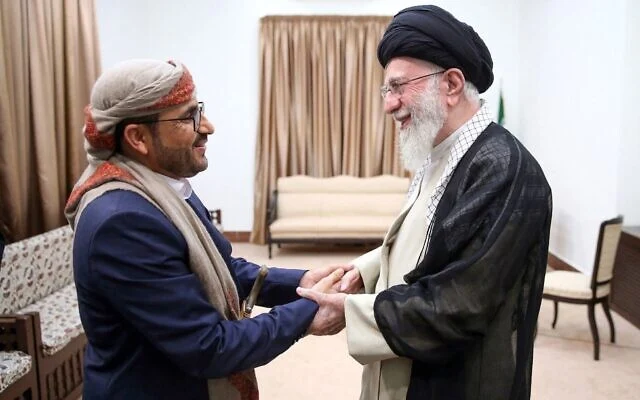Yemen’s Iran-backed Houthis have publicly declared their first coordinated military operation with Tehran, launching hypersonic ballistic missiles at Israeli targets in Jaffa. The unprecedented announcement marks a significant escalation in regional tensions as the “Axis of Resistance” openly coordinates attacks against Israel amid the ongoing three-day exchange of strikes between Tehran and Tel Aviv.
Historic Declaration of Iran-Houthi Military Coordination
In a groundbreaking announcement, Yemen’s Houthi movement publicly confirmed conducting joint military operations with Iran for the first time. Military spokesperson Yehya Sarea declared in a televised address that the Yemeni Armed Forces carried out coordinated strikes against Israeli targets using Palestine 2 hypersonic ballistic missiles.
“The missile force of the Yemeni Armed Forces carried out a military operation targeting sensitive Israeli enemy targets in the occupied area of Yaffa using a number of Palestine 2 hypersonic ballistic missiles at various times over the past 24 hours,” the Houthis stated. The group emphasized that “this operation was coordinated with the operations carried out by the Iranian army against the criminal Israeli enemy.”
This marks the first time any member of Iran’s “Axis of Resistance” has publicly acknowledged direct operational coordination with Tehran. The Houthis, formally known as the Ansarullah Movement, control significant territory in Yemen including the capital Sanaa and have been a central component of Iran’s regional proxy network.
The announcement comes as Israel and Iran continue exchanging missile attacks following Israel’s largest-ever military strike against Iran on Friday, creating the most dangerous escalation between the two nations in decades.
Escalating Multi-Front Conflict Against Israel
The coordinated Houthi-Iranian operation represents a dangerous expansion of the regional conflict, with multiple fronts now actively engaging Israeli forces. Israeli military officials confirmed that air raid sirens were activated across several areas following missile launches from both Iran and Yemen.
Sarea framed the operation as “triumphing for the oppressed Palestinian and Iranian peoples,” directly linking the attacks to broader regional solidarity against Israeli actions. The spokesperson warned Israel to “take the initiative to stop the Israeli crimes against your people in Gaza, for what befalls them today will befall you tomorrow.”
On the same day Israel launched its massive strike against Iran, Israeli authorities reported that a missile launched from Yemen struck Hebron in the occupied West Bank. However, the Houthis did not initially claim responsibility for that particular attack, suggesting possible coordination challenges or separate operational streams within the broader campaign.
The Houthis have maintained consistent attacks against Israel since the October 7, 2023 Hamas assault, claiming their operations support Palestinians in Gaza during the ongoing Israel-Hamas war. Most Houthi missiles have been intercepted by Israeli defense systems, but the volume and coordination of attacks continue escalating.
Trump Administration’s Red Sea Diplomacy Success
The coordination announcement comes against the backdrop of recent diplomatic developments involving the United States and Houthi maritime operations. President Donald Trump successfully negotiated an end to Houthi attacks on American vessels in the Red Sea, leading to a halt in US military operations against the Yemeni group.
The US had intensified strikes against Houthi positions throughout the year as the group targeted commercial shipping lanes, disrupting global trade routes. However, Trump’s diplomatic approach yielded an agreement where Houthis ceased attacks on American ships in exchange for reduced US military pressure.
This diplomatic success now faces potential complications as the Houthis openly coordinate with Iran against Israel, creating new challenges for US regional strategy and alliance management.
Regional Implications of Axis of Resistance Unity
The public declaration of Iran-Houthi coordination signals a potentially transformative moment for Middle Eastern conflict dynamics. Previously, Iran’s proxy relationships operated with plausible deniability, allowing Tehran to maintain strategic ambiguity about direct involvement in regional operations.
Israel has consistently conducted retaliatory strikes against Houthi targets in Yemen, but the new explicit coordination framework may necessitate recalibrated responses. The integration of Houthi capabilities with Iranian strategic planning creates enhanced threats to Israeli security and complicates regional deterrence calculations.
The coordinated operation also demonstrates the Axis of Resistance’s growing confidence in challenging Israeli military superiority through synchronized multi-front pressure. This development may encourage other Iranian proxies, including Hezbollah in Lebanon and various militia groups in Iraq and Syria, to adopt similar coordination frameworks.


